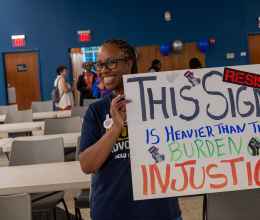A district court jury found that correctional officers violated Mr. Hoever’s First Amendment rights when they repeatedly threatened to kill him in retaliation for filing grievances about his mistreatment. The trial court concluded, however, that the Prison Litigation Reform Act barred him from receiving punitive damages for the correctional officers behavior.
Mr. Hoevver appealed the case to the 11th Circuit Court of Appeals, apparently the only court that had interpreted the Prison Litigation Reform Act as prohibiting punitive damages. The ACLU of Georgia partnered with Davis Wright Tremaine LLP, which represented the Federalist Society, to file an amicus brief to support the Mr. However’s appeal to the 11th Circuit Court to reverse a lower court’s decision.
Correctional officers threatened Mr. Hoever with extreme violence in retaliation for his filing of grievances about their physical threats and abuse. But filing grievances was the sole administrative or petitioning mechanism for Mr. Hoever to protect any of his rights while incarcerated. So, while he may not have suffered physical injury from these threats, he suffered substantial harm from the correctional officers' attempt to remove his only means of reporting that abuse.
A jury found that Mr. Hoever’s First Amendment rights were violated seven times. Following the 11th Circuit’s precedent, he received only one dollar in nominal damages for those seven violations. This is not only consistent with the plain language of the statute but also reflects the fact that irrevocable harm occurs when a are fundamentally violated.
Violations of First Amendment rights are unlikely to be accompanied by physical injury, although such violations can cause severe and irreparable harm. As a result, the trial court ruling deprived Mr. Hoever of just compensation for his injuries and allowed countless abuses of constitutional rights to go virtually unchecked.
The Eleventh Circuit had previously interpreted the PLRA to require that an incarcerated person suffer physical injury to receive punitive damages for a First Amendment violation. However, every other circuit court had concluded that a prisoner may recover punitive damages for a First Amendment violation without having suffered physical injury.
In the Hoevver case, the 11th Circuit reversed its position on whether the PLRA permitted punitive damages. The Court wrote
“Over the course of the three-day trial, the jury heard testimony that correctional officers threatened Mr. Hoever on several occasions because he filed grievances against certain officers for mistreatment. Those threats included statements by a correctional officer that, “If you keep on writing grievances, I promise you the next 11 years is [sic] going to be a heartache for you. You need to stop writing grievances right now or we’ll make sure that you stop. . . . If you write another grievance, . . . I’ll take you right now to confinement. . . . I’ll let you go only if you promise never to write a grievance again.” The jury also heard testimony about other occasions in which an officer threatened, “We’ve been killing inmates here for a long time and nobody can do a damn thing to us,” and a threat to “take [Hoever] to confinement and starve [him] to death” if he filed additional grievances. Witnesses testified to hearing these threats. After deliberation, the jury returned a verdict in favor of Mr. Hoever, finding that his First Amendment rights were violated seven times.
The 11th Circuit reversed the District Court’s dismissal of Mr. Hoever’s First Amendment punitive damages claim and remanded for further proceedings. In its decision, the court wrote
“The government now concedes that nothing in § 1997e(e) limits the availability of punitive damages ‘for any kind of violation, constitutional or statutory, absent a showing of physical injury.’ …
"Because our interpretation runs counter to the text of the statute, today we correct our course. We now recognize that § 1997e(e) permits claims for punitive damages without a showing of physical injury.”

